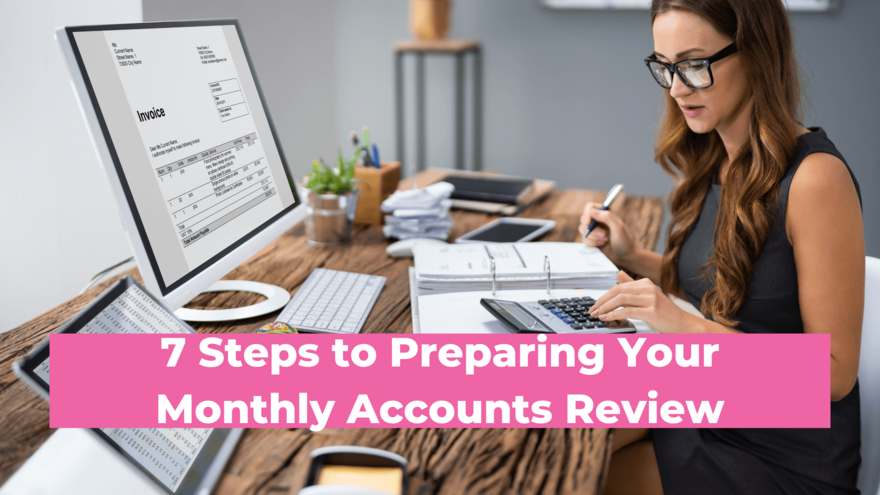7 Steps to Preparing Your Monthly Accounts Review

As a small business owner, you need to produce accounts. For the self-employed, this is done once a year as the basis of your tax return. If your business is through a limited company, you must submit a set of accounts to Companies House each year.
This task alone seems like a real headache for many small business owners, so why would you prepare monthly account data? Firstly, preparing your accounting data each month breaks down the mammoth annual task into bite-sized chunks, and you also get the opportunity to review what is happening in your business shortly after it happens. Course corrections are more effective when the action is taken swiftly.
Monthly financial data
If you are planning on preparing your own monthly accounts, here are seven steps to preparing your monthly accounts review.
Balance your bank account Ensure that all the entries that are in your bank account, payments and receipts, have been recorded in your accounts. You should carry out this exercise whether you are using an accounts journal or workbook, a spreadsheet or an accounting package. You may perform this action as part of your weekly tasks; that's great; it's one less thing to do here.
Make sure you have reconciled your PayPal account and any card payment systems.
Check Stock Levels If you have a fast-moving business or part of your business that involves holding physical stock, you should consider carrying out this task weekly. For slower-moving stock, a monthly review is sufficient. What is the value of the stock you have? Do you need to reorder any stock items?
Payroll Administration If you have employees, then you will probably carry out this task before the month-end, in week 4. Of course, if you pay any staff weekly, this is a weekly task. If you use subcontractors instead of permanent members of staff, then ensure that they are paid promptly and arrange their payments as soon as possible.
Remembering the additional expenses too
Business Motor Expenses You may record your business mileage on a daily or weekly basis, but at the month-end, you will want to record a monetary value for this mileage in your accounts.
Use of Home Expenses Just as with motor expenses, if you are claiming the use of home expenses, then this will need recording each month.
Business Expenses Paid For Privately This point is often overlooked, but you don't want to miss out on claiming all the relevant expenses, so check your personal bank accounts and credit card statements for business expenses and then record them in your accounting records.
And finally .....
Prepare your profit and loss account If you are using an accounting software package, then this will be a matter of just running the profit and loss account report. All a profit and loss account statement involves is the total sales for the month at the top of the page. Next comes a list of expenses, grouped under headings such as telephone charges, office expenses, training etc... The final figure is the month's profit, which is simply calculated as income minus expenses.
Take action when you have your data
Now that you know how much profit you have made in the month, there are a couple of things you still have to do:
Firstly, pay yourself. This is an important step, so you don't want to miss it! If you pay yourself a weekly or monthly basic amount to cover your personal expenses, now is the time to see if you can transfer any additional funds. Remember to leave enough funds in the business to support your imminent cash flow requirements.
Secondly, transfer a sum to your savings account to cover your tax bill.
That's it. Now that you have this monthly information, you are in the driving seat for your business. Are your sales what you were expecting? Did you overspend in any areas? You are now in a position to take any corrective action.
0 comments
Leave a comment
Please log in or register to post a comment